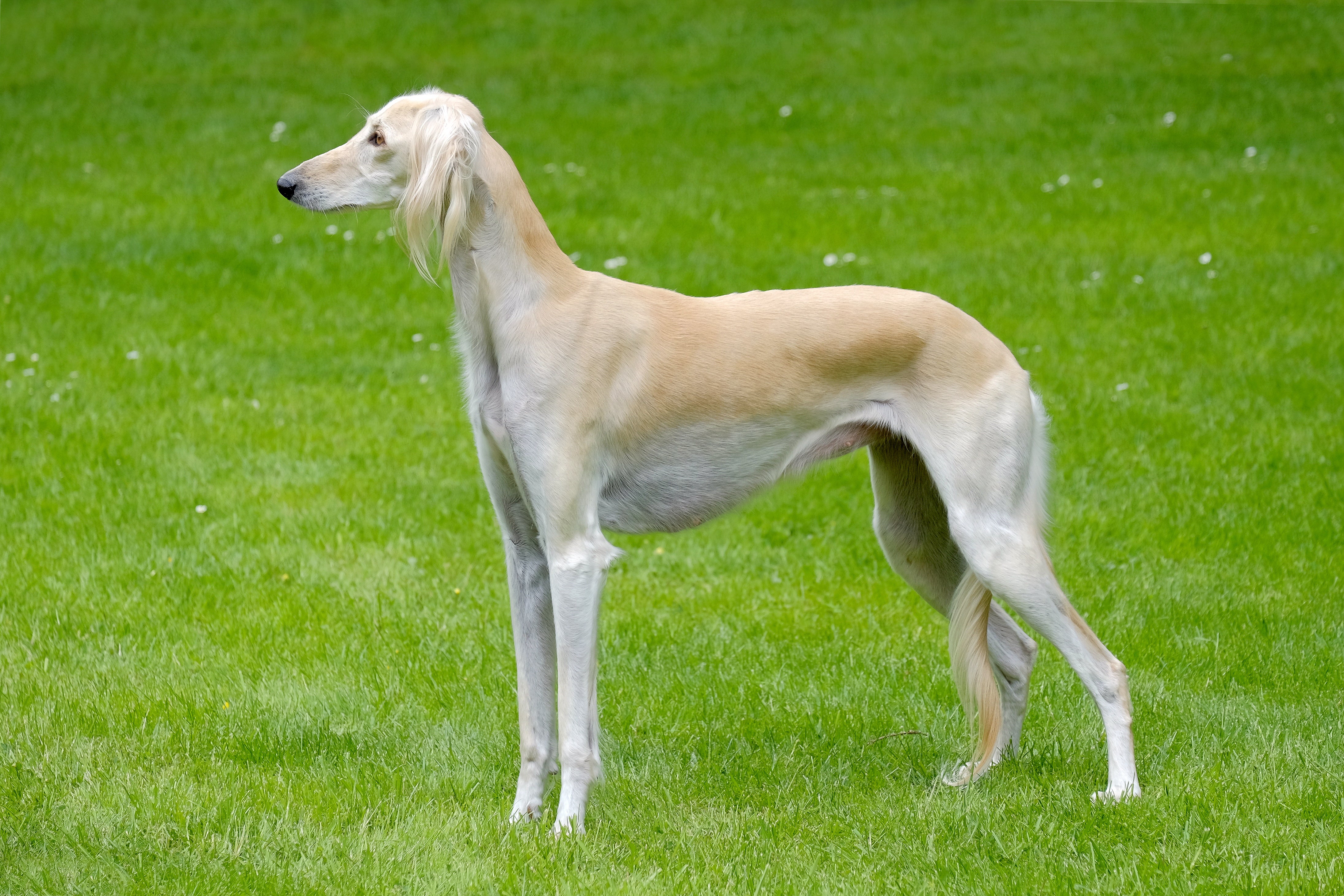Saluki
The Saluki is a graceful, athletic sighthound renowned for its speed and endurance. With a slender, Greyhound-like build and long legs, this breed exudes elegance and power. Their coat can be smooth or feathered, varying in color and pattern. Their movement is effortless, reflecting their ancient heritage as hunters of the desert.
Breed characteristics carousel
Learn More
Need to Know
- Suitable for experienced owners
- Extra training required
- Generally healthy breed
- Enjoys active walks
- Medium dog
- Some drool
- Requires regular grooming
- Chatty and vocal dog
- Barks and alerts to visitors/anything unusual
- Could have issues with unknown dogs but gets along with known dogs
- May need additional training to live with other pets
- May need additional supervision to live with children
- Needs a large yard in the suburbs or rural areas
- Can be left alone occasionally with training
- AKC Registered Breed

Personality
Think of Salukis as the cat-like creatures of the dog world: independent yet fiercely loyal. While they form deep bonds with their humans, don't expect a slobbery welcome home; their greetings are more of a regal nod. Gentle and dignified, Salukis are known to provide their humans with quiet affection.
The Saluki is one of the world's oldest dog breeds. Case in point: Egyptian tombs showcase their elegant figures, dating back thousands of years. These desert nomads were prized hunting companions for Bedouin tribes, working alongside falcons to chase down prey. Revered as "the noble one," Saluki dogs enjoyed a privileged status, sharing their owners' tents and hearts. Strict breeding practices preserved their pure lineage for centuries. However, the breed's numbers dwindled in their native lands. Thanks to dedicated enthusiasts, the Saluki found its way to the Western world.
The Saluki’s distinctive personality requires a patient and understanding owner, preferably with sighthound experience. These dogs can be both refined and boisterous, intelligent yet seemingly oblivious. Their independent nature often extends to training, especially recall. If you're up for a challenge and can appreciate a touch of royal sass, a Saluki might be your perfect match.
Salukis are sprinters at heart and require daily bursts of high-intensity exercise. Incorporate plenty of off-leash running time in a safe, enclosed space. Their hunting instincts can kick in unexpectedly, so supervision is essential. When not chasing imaginary prey, Salukis are typically calm and relaxed indoor companions.
Salukis are relatively quiet indoors, however, their demanding exercise needs require access to a safe, enclosed outdoor space where they can run freely. Rural or suburban environments offer the ideal setting for these energetic, long-legged pups.
Salukis require regular grooming to maintain their coat's beauty. Brush your Saluki's coat a few times a week, paying extra attention to the feathered areas, which are prone to tangles. This routine care will keep their coat smooth and healthy and prevent matting.
Salukis like to think they're royalty when it comes to training, so expect a touch of "I'm too good for this" attitude at first. Don’t worry, though: Positive reinforcement is your royal decree. And remember, their inner cheetah might surface at any moment, even with the best recall training.
Salukis prefer calm environments and respectful interactions, making them better suited to adult-only homes or families with older, considerate children. If you are bringing a Saluki into a home with a cat, slow and steady (with plenty of supervision) is the best approach for introductions.
The cost of a Saluki from a breeder is significantly more than the cost of adopting one from a local shelter or rescue. The adoption fee usually covers additional items such as spaying or neutering, vaccines, and microchipping.

Learn more about feeding and caring for your Saluki on Purina.
Did You Know?
- Salukis were so beloved by ancient Egyptian royalty that their passing was mourned deeply. These canine pharaohs were often mummified while wearing their hunting finery. Even the legendary King Tutankhamun shared his tomb with his cherished Saluki compani
- Beyond their Egyptian roots, Saluki dogs have also been prized by royalty in other parts of the world, including Persia and Arabia.
